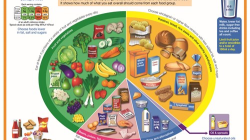What is eating well?
Eating well means choosing a wide variety of foods which provide enough nutrients to maintain a good nutritional status and maintain your weight. Eating well will also help you to keep up your strength and energy levels, support your immune system, and improve your general well-being.
These nutrients include energy (calories), protein, carbohydrates, fats and vitamins and minerals. Fibre is also an important nutrient in diet as it helps with bowel function, regulates bowel movements and prevents constipation.
The Eatwell Guide below shows the balance of how different foods can contribute to a healthy balanced diet and provide nutrients needed by the body.
Fruits and vegetables
- These are a good source of vitamin, minerals and fibre.
- Aim for 5 portions or more of fruit and vegetables per day. Try to limit fruit juice and dried fruit to just 1 of your 5 portions per day, if you are able to.
- One portion =
= 80g fresh fruit or veg
= 30g dried fruit
= 150ml fruit juice
- Fresh, frozen, tinned and dried fruit and vegetables all count
- If you have been told to follow a low fibre diet, it can be challenging to achieve your 5 a day – please get in contact with our dietitians if you have any concerns.
Potatoes, bread, rice, pasta, and other starchy carbohydrates
- These are a food source of energy, vitamins, minerals and, if choosing wholegrain varieties, are a good source of fibre.
- Carbohydrates should make up one third of your diet
- Choose wholegrains if appropriate for you
- Cous cous, quinoa, bulgar wheat and other grains are all also examples of sources of carbohydrates
Beans, pulses, fish, eggs, meat and other proteins
- These foods are a source of protein which are building blocks for our body cells. Protein is essential for growth and repair of cells and muscle strength. Meat can also provide vitamins and minerals e.g. iron, zinc and vitamin B12, while fish provides essential fatty acids.
- Aim for 2 portions of fish per week, one of which should ideally be oily.
- Aim for a maximum of 3 portions of red meat per week and avoid all processed meat if possible. Processed meats can include ham, salami, bacon and some sausages.
- Beans and pulses, and meat (e.g. Quorn or soya) substitutes are also a good source of protein.
Dairy and alternatives
- These are good sources of protein, vitamins and minerals including vitamin B12, calcium and iodine.
- Alternative milks are much lower in protein and calcium. Soy milk has the best protein content and aim to choose alternative milks fortified with calcium.
Oils and spreads
- These foods are high in energy (calories) and are only needed in small amounts.
- Aim to choose unsaturated oils and spreads where possible e.g. Rapeseed, Sunflower and Olive oils and spreads
Foods high in fat and sugar
- These foods are generally high in calories and should be kept to a minimum unless advised otherwise by a healthcare professional
Fluids
- Fluids are important for hydration
- Aim to have between 6-8 cups per day
- Water, tea, coffee, milk and sugar free drinks count. However, caffeinated drinks and fruit juice should be kept to a minimum.
- Alcohol does not count
Dietary recommendations for cancer prevention and after cancer treatment
The World Cancer Research Fund (WCRF) recommends the following for cancer prevention and for health and wellbeing after cancer treatment.
1. Be a healthy weight - After choosing not to smoke, being a healthy weight is one of the most important ways you can reduce your risk of cancer and other health conditions such as diabetes and heart disease. The WCRF Be a Healthy Weight guide can be found here.
2. Move more
3. Enjoy more wholegrains, vegetables, fruits and beans
4. Limit processed foods high in added sugar, or low in fibre or high in fat
5. Limit red meat (such as beef, pork and lamb) to 350-500g (cooked weight) per week and avoid processed meat (e.g. bacon, salami, chorizo, ham, corned beef)
6. Limit sugar sweetened drinks
7. For cancer prevention, don't drink alcohol (if you do, limit to 14 units per week with at least 2 alcohol free days)
8. Don't rely on supplements to protect against cancer
9. After a cancer diagnosis it is recommended to follow the above recommendations.

